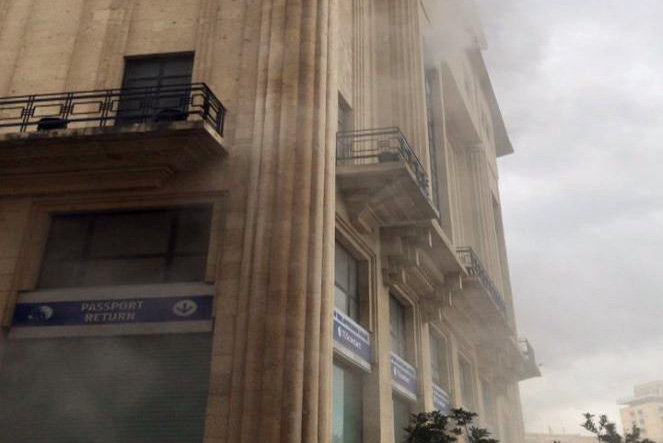
According to the PwC Global Crisis Survey published at the end of 2019, almost 7 in 10 (69%) business leaders went through at least one corporate crisis in the last 5 years. Since the COVID-19 pandemic, it has become evident that no one and no region is immune. Although this case concerns a fire at one of our Visa Application Centres, the lessons learned are valid for any crisis.
On February 9th 2020, sparks caused by ongoing construction work at TLScontact’s centre in Beirut started a fire within the building. Luckily, this occurred on a Sunday morning, when our centre was closed. Its central location also allowed the fire to be put out very quickly. The local management team immediately started implementing the contingency plan, informing our government clients of the incident and bringing in colleagues on the same day to create a taskforce to deal with the crisis.
Thanks to the efforts of our local team and the support of the local consulates that we serve in Beirut, we were ready to resume visa processing just two days later, in temporary premises. Our teams then worked non-stop to clean the centre and prepare it for reopening, only one week after the fire.
There are three important lessons that we can take away from this incident.
Rapid response is everything
By their very nature, crises are unpredictable and when an emergency strikes, it is vital to respond as quickly as possible to mitigate the impact. The fast mobilisation of both the local emergency services and the TLScontact team in Beirut clearly helped to reduce the impact of the fire and to limit disruption for our visa applicants and government clients.
- Once the fire had been put out, the local managers assembled a crisis team mid-afternoon on the Sunday to deal with the situation;
- Roles and responsibilities were allocated to each team member during a one-hour meeting, the necessary decisions and actions were taken and documented. Then, each person got down to work;
- The first reflex, once the premises were deemed safe, was to inspect high-risk items such as passports and essential documents and remove them to a safer location. The local staff also started moving key IT equipment;
- Temporary premises were immediately booked at a neighbouring hotel, which had been identified previously in the contingency plan, to ensure the smooth running of operations and main activities while repair work was carried out;
- The local management team also discussed with the local consulates the possibility of providing provisional support on their premises.
All of these decisions, taken over a brief time span, were key to the successful reopening of our visa processing operations just a couple of days later.
Teamwork will get you better results
When the incident took place, the centre manager called on all the local team and their different skills, convinced that involving the wider group would help to lessen the difficulties. They rose to the challenge, working around the clock for two days to deal with the crisis and ensure that operations were able to resume as quickly as possible.
Our Beirut visa application centre also had the great advantage of being able to call on the support of teams in neighbouring countries like Egypt and Jordan, who were able to assist with communications to visa applicants, as they were open that Sunday. They also benefited from the assistance of our Technology support function to get IT systems up and running within 48 hours in new premises, while respecting all the necessary security protocols that apply when processing confidential applicant data.
Finally, the team were able to rely on the support of the local consulates, who provided temporary office space at very short notice to allow visa applications to be collected by TLScontact staff while the Beirut centre remained closed.
Thanks to this great team effort, it took our Beirut operations only two days to reopen in temporary premises and then a further four days before our permanent centre was able to reopen to visa applicants once again.
Don’t forget to communicate
Finally, clear communication is absolutely key at times of crisis and this incident was no exception. Our local managers were all too aware of the importance of communicating in a timely and efficient manner to all stakeholders. First, they made sure that all staff members understood the gravity of the situation and their precise role in dealing with the crisis. They then focused on:
- Informing our government clients about the incident and the potential implications, reassuring them on the safety of all documents, passports and centre equipment and providing them with regular progress reports on repair work;
- Advising visa customers of changes to their appointment time and address via telephone, e-mail and text message, as well as updating public websites with the relevant information to avoid any possible confusion and prevent applicants from missing their scheduled visa appointments;
- Updating the TLScontact senior management on the incident, with detailed daily reports on the measures taken and progress made towards resolution of the different issues raised.
Crises often hit when you least expect them, as the last few months dealing with COVID-19 have taught us all. However, as the fire at our Beirut centre illustrated, in every crisis there are also opportunities. This incident allowed our local team to demonstrate their collective strength and agility and develop a stronger relationship with our local clients, as they worked together to reopen our operations in record time.